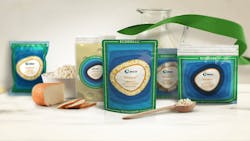Tech-Forward Manufacturers Make Sustainable Packaging a Priority
Imagine a line of garbage trucks, filled to capacity with discarded plastic packaging, stretching bumper-to-bumper across three lanes of traffic all the way down I-95 from Boston to Miami. Then dump all that waste in the Port of Miami. Every year.
That's how much plastic—14 million tons—is discarded into the world's oceans annually, according to the International Union for Conservation of Nature. And even that staggering figure is only a fraction of the 400 million tons of plastics produced annually.
This pollution is contributing to significant ecological and public health challenges. While individuals can support this effort by recycling plastics that can actually be recycled (only around 5%), companies have the potential to lead the way by adopting more sustainable packaging solutions and materials that minimize pollution at the source.
That transition is possible with some outside-the-box thinking and new technology. In fact, at some companies, it's already happening.
Consider how some companies have found ways to eliminate the need for certain plastics entirely. In 2020, Starbucks ditched straws in favor of sippy cups, eliminating the need for a billion straws per year. Barilla Pasta, in a similar move, realized that it didn't need to include a plastic see-through window on its boxes to show consumers what the pasta looks like—pictures on a new 100% recyclable box work just fine.
Virtual-Twin Potential
Roughly 80% of a product's entire environmental impact is determined during the design phase. Of course, many companies can't eliminate plastic products overnight. But they can still find ways to make their packaging greener by taking advantage of the best of modern technology.
Consider the power of "virtual twins," a type of computer simulation that allows companies to design, visualize, model and test everything from new biodegradable materials and sustainable bottle shapes to the entire manufacturing process of said bottle on the factory floor.
This technology opens up possibilities for packaging manufacturers as they experiment with various new materials for sustainable packaging. Virtual twins allow them to construct, interact with and evaluate models of different materials to determine the best sustainable option before developing a physical prototype. For instance, companies can use virtual twins to study the structural integrity of a bottle as it's filled and emptied -- or how cardboards will deform under different pressures.
Dassault Systemes clients that adopted of virtual twins in the consumer-packaged-goods industry, on average, reduced material consumption by 15%, according to a 2021 report. Additionally, implementing virtual twin lifecycle assessment technologies at the design stage saved an estimated 7.2% in the product's greenhouse gas footprint.
Simulations Applied to the Real World
Amcor—a global leader in manufacturing packaging for brands like Pepsi, Coca-Cola, Colgate and Nestle—harnessed the power of virtual twin technology to design more sustainable packaging at the material and structural level. By creating detailed digital replicas of its packaging, Amcor's engineers could simulate real-world conditions—such as stress, temperature fluctuations, and impact tests—without the need for physical prototypes.
This digital approach allows designers to experiment with different materials, structural geometries, and wall thicknesses, while advanced computational models help pinpoint exactly where material can be reduced without compromising performance. In making its packaging more lightweight, Amcor was able to reduce the amount of polyethylene terephthalate (PET), a non-biodegradable plastic, in packages by 100 million pounds every year.
The ability to run over 10,000 simulations on different designs and materials—by limiting the need to manufacture physical prototypes—saved Amcor both time and money in the design process and helped develop designs that reduce the weight of its bottles by up to 50% .
One of the largest cosmetics companies in the world, Boticário Group, understood that sustainable packaging doesn't just mean packaging goods in easily recyclable or biodegradable materials—it means a commitment to sustainability throughout the entire packaging process.
Using a virtual twin to replicate its factories, Boticário was able to design and implement a more efficient manufacturing process that can identify and predict potential bottlenecks in real time to minimize the waste generated. This has helped Boticário recycle more than 97% of all waste back into the company's operations. In fact, more than 75% of all Boticário cosmetic products contain recycled materials in their packaging.
Winning Consumer Approval
There's plenty of evidence that consumers award companies that invest in sustainability. According to a recent McKinsey report, the majority of consumers are willing to pay extra for sustainably packaged products—even in developing countries.
Technology is making possible a vastly more sustainable world. Edible drink pods can store liquids while removing packaging altogether. Cutting-edge mycelium packaging harvested from mushrooms is biodegradable within 45 days. Leveraging 3D printing technology, meanwhile, can eliminate up to 90% of scrap waste in the manufacturing process and use recycled plastics and metals to manufacture new packaging.
The future of sustainable packaging is bright, if industry, government and research institutions collaborate to redesign products and rethink their use and disposal. Some companies are already making effective changes, but more must be done.
By harnessing innovative incentives to encourage recycling, leveraging technology to develop greener packaging and advancing environmentally conscious manufacturing processes, manufacturers have the power to reduce plastic waste and protect the health of our planet. Together, companies can safeguard our oceans, preserve ecosystems and ensure a more sustainable future for generations to come.
About the Author
Raymond Wodar
Global Director of Business Consulting, Consumer Packaged Goods & Retail, Dassault Systèmes
Raymond Wodar has been with the Dassault Systèmes team for 17 years and has more than 20 years’ experience focused on innovation platform strategies in the consumer packaged goods, life sciences and specialty chemical industries. Portfolio breadth includes best practice industry solution experiences for R&D formulation and materials development, packaging design and simulation, manufacturing production and supply chain optimization. In his time with Dassault Systèmes, Ray has been responsible for R&D product strategy and industry value consulting functions within these industries worldwide.
